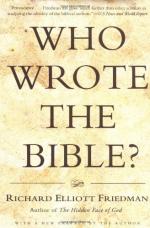
|
| Name: _________________________ | Period: ___________________ |
This test consists of 15 multiple choice questions and 5 short answer questions.
Multiple Choice Questions
1. Who allows the Jews to return to their home country?
(a) Cyrus the Great.
(b) Alexander the Great.
(c) Ramses the Second.
(d) Baltshazzar the Benevolent.
2. What is Friedman's description of Author P?
(a) likely an Aaronid priest and therefore male.
(b) a scribe from Judah.
(c) possibly a Mosiac itinerant priest.
(d) possibly a man or a woman.
3. What does Friedman speculate held the exiled Jews together?
(a) the resistance they put up.
(b) the blood relationship among them.
(c) the nature of the Jewish religion.
(d) the smuggled copies of the Torah.
4. How does Friedman remind the reader that one can only really understand the exile?
(a) by memorizing Lamentations.
(b) by experience of it first hand.
(c) by reading the Psalms.
(d) by archeological evidence.
5. How is Baruch mentioned in the book of Jeremiah?
(a) as a teacher of Jeremiah.
(b) as a replacement for Jeremiah.
(c) as a brother of Jeremiah.
(d) as writing for Jeremiah.
6. What is Author P's interpretation of God?
(a) a mysterious and capricious God.
(b) a diety modelled after the pagan gods.
(c) a gracious and merciful God.
(d) a dispassionate and just deity.
7. Why is it significant for some to trace their priestly ancestry back to Aaron?
(a) he was given the Ten Commandments.
(b) he was a goldsmith as well as a priest.
(c) he was the first Jewish High Priest.
(d) he was more important than Moses.
8. With what did Ezra return to Judah?
(a) a blueprint of the Temple.
(b) a copy of the Torah that is in modern usage.
(c) a new revelation from God.
(d) an army of 10,000 men.
9. What is in Deuteronomy to set up the possibility of the fall of Judah?
(a) references to the flood.
(b) references to the last king of Judah.
(c) references to being pursued.
(d) references to being exiled.
10. According to Friedman's theory, when does that place Author P in time?
(a) during the time of the conquest of Canaan.
(b) during the time of King David.
(c) during the time of the first Temple.
(d) during the time of the exile.
11. What happened to the Davidic covenant after the invasion of the Babylonians?
(a) God had to be reminded of his promise to David.
(b) a descendant of David is made governor of Judah.
(c) the Temple is rebuilt and a Davidic king is put in charge.
(d) the king is no longer on the throne and the Temple is burned.
12. What does Friedman show about the Tabernacle and the Temple?
(a) there are incredible similarities between them.
(b) there is no direct scaling of one to the other.
(c) they are made of the same materials.
(d) they are in perfect scale one to the other.
13. Who had been a Levite priest of Anathoth and had never done sacrifices?
(a) Ezra.
(b) Jeremiah.
(c) Isaiah.
(d) Samuel.
14. From where did some of the inclusions into the Pentateuch come?
(a) the Davidic traditions.
(b) the apocrypha.
(c) the Book of Generations.
(d) the Book of the Dead.
15. Where do the authors D and E write that Moses received the Ten Commandments?
(a) Mt. Zion.
(b) Mt. Olives.
(c) Mt. Horeb.
(d) Mt. Sinai.
Short Answer Questions
1. Why does Friedman hold early Biblical scholars in high esteem?
2. What is the guilt of the Jews that led them into exile?
3. How were books written at the time of the Pentateuch authors?
4. What is the first law given in Deuteronomy?
5. What does the revision to Deuteronomy explain?
|
This section contains 643 words (approx. 3 pages at 300 words per page) |

|




